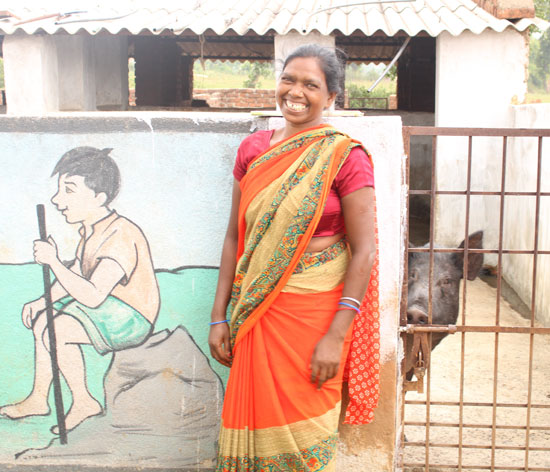
Many residents of Kajri, a small but scenic forest-fringed village in Churchu block of Jharkhand’s Hazaribagh district, lead a hand-to-mouth existence. Shanti Devi Soren, a 41-year-old farmer, was once one of them. But thanks to the Lakhpati Kisan: Smart Village programme, a Tata Trusts-supported programme that empowers farmers to adopt high-value agriculture (HVA), Ms Soren and her family are financially more secure today than they’ve ever been. Prior to 2015, Ms Soren’s family of five, including her husband Mahabir Soren and three children, could only afford two meals a day. The primary reason was the low yield from their one-acre paddy farm. Although the family owned 6.5 acres of farmland, most of it was upland area, where yields were low since the sloping landscape could not retain the water necessary for paddy cultivation. And so, to augment the family’s meagre income, Mr Soren had to migrate every year during the non-kharif season to find work outside the village. One of their daughters was even forced to drop out of school.
Transformation came in 2015 in the form of the Lakhpati Kisan livelihood programme, a part of the Tata Trusts’ Mission 2020 – Lakhpati Kisan: Smart Villages initiative. Executed by the Trusts’ nodal agency, Collectives for Integrated Livelihood Initiatives (CInI), the programme aims to create ‘lakhpati kisans’ – farmers with an annual income of at least Rs100,000 – across the central Indian belt comprising Jharkhand, Odisha, Maharashtra and Gujarat.
The programme’s inception marked Ms Soren’s (and her village’s) first step towards HVA, which focuses on vegetable cultivation on the uplands. Ms Soren joined a newly-formed women’s group, Barsha Mahila Vikash Sangh, that was set up with institution-building assistance from the Trusts team. Each group member contributed Rs20 per month, and the corpus was used by members to procure and cultivate crop varieties like SRI paddy, as well as improved breeds of tomato, brinjal, bottle gourd, watermelon, and other crops.
In 2017, the EY Foundation came on board the Lakhpati Kisan programme. Through a grant made by the Foundation, solar micro lift irrigation systems were installed across a 4.15-acre area belonging to the members of the Barsha Mahila Vikash Sangh. Robust farming practices like drip irrigation and mulching were also introduced to ensure irrigation, prevent evaporation loss, and mitigate weed attacks. All these steps helped Ms Soren and her group to elevate their farming practices to the next level.
The field staff, especially the LRPs (local resource persons) also provided the group with technical support for the cultivation of SRI paddy and tomato crops. Meanwhile, the EY Foundation facilitated 30 capacity-building training sessions on institution-building for Ms Soren and her group. These sessions, conducted over a period of two years, strengthened the group members’ management and financial knowledge.
Today, Ms Soren and the other women of the Barsha Mahila Vikash Sangh are firm supporters and advocates of HVA. Each of them has increased their monthly contribution to Rs80. In 2018, Ms. Soren also became a shareholder of the Churchu Nari Urja Farmer Producer Company Ltd. (CNUFPCL), and began working to increase the business of CNUFPCL as well as to inspire other women farmers to join it. Today, she plays an integral leadership role in evangelising the initiative in her village.
Ms Soren’s own income has dramatically grown as a result of adopting HVA. Using new agricultural patterns and getting assured irrigation facilities and technical support from the team has enabled her to earn Rs2,25,000 in the 2021-22 cropping season. She is upbeat about the future and hopes to grow her income to up to 400,000 soon. Ms Soren has also opened a bank account for the first time and has bought a power weeder (an expensive piece of agricultural equipment) for supporting the family’s agricultural activities. This has only been possible due to the surplus income she earned from agriculture.
With increasing success comes ambition. Ms Soren and her husband have become successful pig entrepreneurs. Using piggery as a secondary livelihood source, they earn almost Rs3,00,000 a year in addition to their income from HVA and paddy. They have also bought a small auto, costing around Rs200,000, for transport purposes. In addition, the family has started a tent business in 2021-22 from the capital amassed through their agriculture and piggery activities which helps them earn around Rs150, 000.
Having become a ‘lakhpati kisan’, Ms Soren now motivates others in her village to join the women’s groups and become financially literate. In fact, she has enabled six other women in the Barsha Mahila Vikash Sangh to earn upwards of Rs100,000 annually. She also proactively generates awareness about social issues like health and sanitation in the village.
Her family’s fortunes have turned around with this new-found prosperity. Ms Soren’s husband no longer has to migrate for work, and now helps her out on the farm and in the piggery. The family has purchased a motorbike. Her children now study in private schools and Ms Soren has also funded the marriage of her older daughter.
Today Ms Soren is grateful for the support from CInI-Tata Trusts and the EY Foundation that has transformed her life. “The Tata Trusts’ Lakhpati Kisan Smart Villages programme is a blessing in disguise for me and the other didis in our village,” she says.
